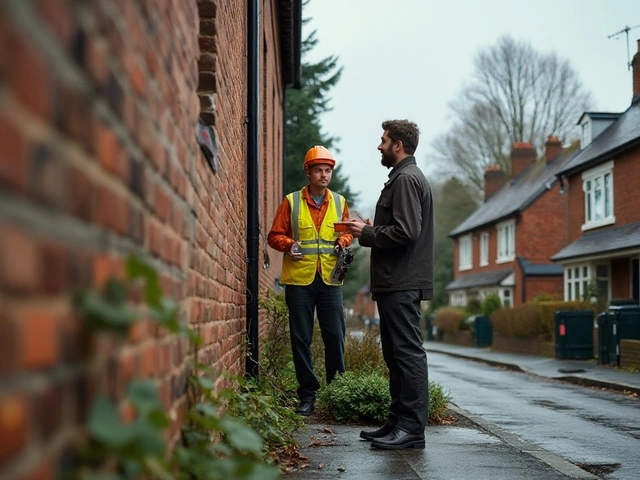
Ever wondered who really rakes in the big bucks on a construction site? Spoiler: it’s not always the guy in the hardest hat or even the loudest one at lunch. The highest paid spots in construction don’t always go to the people you’d expect. In some cases, just having a rare skill or a certain certification can send your paycheck into a completely different league.
If you’re thinking about jumping into construction work—or want to move up in your current role—it pays to know which jobs top the salary charts. Some people think all construction workers get the same kind of pay, but that’s miles from the truth. Super-specialized trades, heavy equipment operators, and supervisors often see more on their checks than you might imagine.
What’s really wild? Salaries in this field can swing a lot based on where you live, how many years you’ve put in, and what extra cards you bring to the table—like welding certifications or OSHA credentials. That’s why it’s smart to dig a little deeper before you settle for the first offer that comes your way. Stick around to find out what makes the difference between an average paycheck and one that turns heads.
- What Sets the Top Earners Apart?
- Job Titles That Dominate the Pay Scale
- How Experience and Location Drive Salaries
- Tips to Level Up Your Construction Pay
What Sets the Top Earners Apart?
Not every construction worker walks away with a heavy wallet. The people pulling in the biggest paychecks in construction have a mix of things going for them. It might start with natural talent for a trade, but the real difference comes down to training, experience, and licenses that open more doors.
The highest paid construction workers usually have skills you can’t just pick up on the job. Think about crane operators, elevator installers, or specialized welders. These gigs all demand certifications and lots of practice. Many of them have gone through union apprenticeships or racked up years in the field before hitting top dollar. These folks know how to handle equipment most people would be scared to touch.
There’s also a big jump in pay for folks who move up to lead roles, like foremen or construction managers. These aren’t just the guys barking orders—they’re running the job, balancing budgets, and making sure nothing gets missed. That responsibility comes with better pay—sometimes even six figures if you’re in a busy city or a booming market.
It’s not just about fancy titles. Here’s what usually bumps a worker up on the construction salary ladder:
- Certifications (OSHA, heavy equipment, or specialty safety training)
- Years of hands-on experience
- Willingness to work longer hours, nights, or weekends
- Ability to travel for big out-of-town projects
- Being part of a strong union (like the International Brotherhood of Electrical Workers or Operating Engineers)
Check out this quick snapshot of what top earners are packing behind their paychecks:
| Factor | Impact on Pay |
|---|---|
| Specialty Skills | High (Can double base pay) |
| Certifications | High (Adds $5,000–$20,000/year) |
| Experience (10+ yrs) | Very High (Often $30K+ higher) |
| Leadership Roles | Very High (Up to six figures) |
If you want to break into the top earnings bracket, start stacking up those skills, go where the big projects are, and don’t be afraid to chase the tough roles. That’s how you land the best pay in construction jobs today.
Job Titles That Dominate the Pay Scale
Let’s get right to it—when you look at highest paid construction worker jobs, some titles always show up at the top. These folks don’t just swing hammers; they either run the job site, bring in a unique skill nobody else has, or operate the kind of machines that cost more than some houses.
Here’s a quick hit list of roles that usually pull the biggest paychecks:
- Construction Managers and Site Supervisors: These guys call the shots. They handle budgets, crews, schedules, and safety. If anything goes wrong, it’s their problem. Median salaries often top $100,000 in big metro areas, and if you’re running mega-projects, it goes even higher.
- Crane Operators: Not everyone’s cut out to run a crane. You need certification and nerves of steel, especially when working at insane heights. It’s common to see annual pay around $70,000–$90,000, with overtime making a big difference.
- Elevator Installers and Repairers: This is one of those hidden-gem gigs. These pros often make more than $100,000 a year, thanks to union jobs, city demand, and pretty intense certification needs.
- Power Line Installers: The danger factor pays. Working up high near live wires means these workers are paid really well—$80,000 or more isn’t rare, and with experience, it keeps climbing.
- Industrial Electricians and Plumbers: The super-skilled trades are big earners—think $65,000–$95,000, especially if you’re in a major city or in a union. These roles often get the lion’s share of overtime and premium pay, too.
If you want to see how some of the big jobs stack up, check this out:
| Job Title | Average Annual Pay (USD) | Why So High? |
|---|---|---|
| Construction Manager | $103,000 | Leadership, responsibility, project size |
| Elevator Installer | $102,000 | Unionized, specialized, city demand |
| Crane Operator | $88,000 | Certified, high-risk, overtime pay |
| Power Line Installer | $85,000 | Hazard pay, specialized skill |
| Industrial Electrician | $80,000 | Certification, technical skill |
The takeaway? If you want to be the highest paid construction worker, target jobs where you need extra training, rare skills, or are responsible for safety and crews. It’s not just about working hard—it’s about working smart and aiming for the spots with the biggest rewards.

How Experience and Location Drive Salaries
Your years on the job matter—a lot. In the construction salary game, starting pay is just the tip of the iceberg. For example, entry-level electricians might start around $42,000 a year in the U.S., but veteran pros with 10 years under their belts can easily make north of $80,000, depending on their specialty and the projects they land. The same jumps show up for other high-demand skilled trades like plumbers and crane operators.
But here’s another kicker: where you work often counts just as much as how long you’ve worked. Wages in construction can change a ton across states—even cities. Got a job in San Francisco or New York? You’re probably looking at pay at least 30% higher than in smaller towns in the Midwest or South.
| City | Average Electrician Salary (USD) |
|---|---|
| San Francisco, CA | $99,000 |
| Dallas, TX | $60,000 |
| Orlando, FL | $55,000 |
Places with high living costs usually pay more to keep workers around. In fact, travel gigs on big infrastructure projects or in remote areas—think Alaska pipelines or high-rise jobs in Manhattan—regularly offer bigger payouts and hefty per diems.
Want a real-world example? According to the U.S. Bureau of Labor Statistics, carpenters in Illinois average $70,000 a year, while their counterparts in Alabama might see closer to $45,000. That’s a night-and-day difference for the same title.
“Location is one of the biggest factors affecting construction pay. High-demand areas attract the best talent with higher wages and better benefits,” says Mike Rowe, creator of Dirty Jobs.
Don’t forget: licenses, extra certifications, and reputation can also nudge wages up fast, no matter where you punch in. A seasoned journeyman plumber with a specialty license in California is going to out-earn a general handyman almost every time.
Tips to Level Up Your Construction Pay
If you want to climb the construction salary ladder and land among the highest paid construction worker jobs, there are a few tried-and-true moves you don’t want to miss. The big money doesn’t always go to the hardest-working person—it often goes to the smartest worker in the room. Here’s what you need to do to cash in:
- Get Certified: Advanced certifications like OSHA 30, welding, crane operation, or heavy equipment licenses can open doors to higher paying roles. Employers love to see legit skills because safety and efficiency are everything. A journeyman electrician license or NCCCO crane operator cert can bump your pay by as much as 15-25%.
- Specialize: Not all trades pay the same. Electricians, elevator installers, and pile driver operators usually see way bigger paychecks than general laborers. Hone a specialized skill—especially something like rigging or steelwork—and you’ll quickly stand out.
- Move Where the Money Is: Construction salaries in New York, San Francisco, and Seattle run 10-30% higher than the national average. If you’re open to relocation, check out markets with hotter demand for skilled trades.
- Climb the Ladder: Many top-paid workers aren’t swinging hammers—they’re managing teams. If you’ve got experience, start aiming for foreman, superintendent, or project manager jobs. These roles regularly hit six figures.
- Network and Ask for More: Don’t just wait around for a raise. Make connections in the industry, keep tabs on what others in your field are making, and negotiate every time you take a new contract or project. Sometimes, simply knowing your worth can mean an extra 10-20%.
Here’s how some credentials can impact your pay, based on 2024 industry data:
| Certification/Role | Potential Annual Pay |
|---|---|
| Journeyman Electrician | $75,000 - $95,000 |
| CNC Crane Operator | $85,000 - $110,000 |
| Elevator Installer | $100,000 - $120,000 |
| General Laborer (Unskilled) | $38,000 - $50,000 |
Bottom line: invest in your skills, put yourself in the right place, and don’t let your value go unnoticed. It might sound simple, but these steps really do open doors to those top construction jobs and bigger paychecks.




